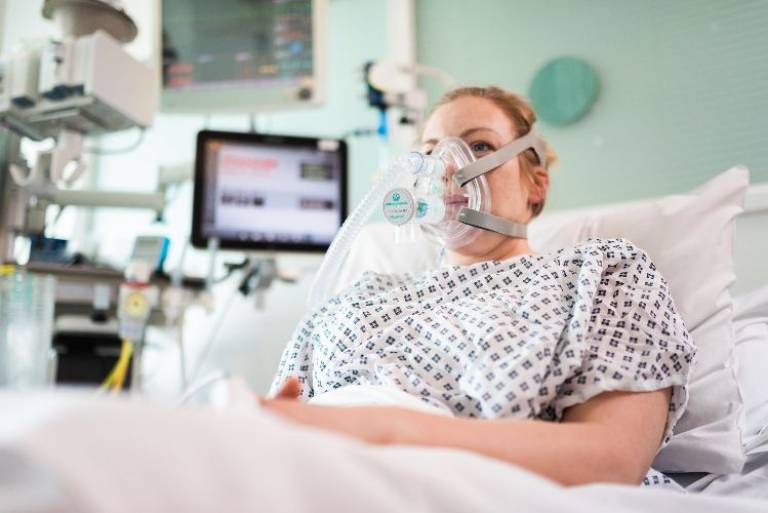Life-saving breathing device wins innovation award
18 March 2021
The UCLH and UCL team behind a life-saving breathing device for COVID patients have won the 2020 Health Service Journal (HSJ) Award for Acute Innovation of the Year for engineering a ‘just-in-time’ COVID-19 solution.

The HSJ Awards celebrate the best teams and people in the NHS and the wider health sector, highlighting excellence and promoting opportunities for funding and innovation within healthcare.
The UCL-Ventura team of UCL engineers and UCLH critical care consultants, in partnership with Mercedes-AMG High Performance Powertrains, led efforts at the start of the pandemic in March 2020 to rapidly develop the UCL Ventura CPAP (continuous positive airway pressure) device, which helps coronavirus patients breathe more easily and keeps them out of intensive care.
Clinical data from UCLH shows that half of patients treated with CPAP do not progress to ventilation, making this device a lifesaver. Clinical practice across the country has now changed with much greater use of CPAP.
It took less than 100 hours from the first discussions in March 2020 to the first prototype being designed, manufactured and tested. The device is now helping patients with COVID in 130 NHS hospitals and in 15 countries around the world.
The HSJ judges praised the "incredible mobilisation at pace through an inspiring network of people and organisations in developing a device that has had a global reach during the pandemic" and said the panel felt "humbled and honoured to receive such a presentation from a truly inspiring group of people.”
Prof Mervyn Singer (UCLH Critical Care and UCL Medicine) said: “It’s great to receive this prestigious award, recognising not just the named team, but the amazing unseen work of literally thousands of people in rapid time. Our collaborations span UCL, UCLH and other hospitals, Mercedes-AMG HPP, G-TEM who have distributed around the globe, regulators, legal experts, communications teams and many, many more suppliers, companies and others. 'Without whom this would not have been possible' is a hackneyed term - but oh so true in this instance!”.
Prof Rebecca Shipley (UCL Institute of Healthcare Engineering) said: "We are particularly honoured to accept this award during a year in which the acute sector has risen to the many challenges of COVID-19 so commendably.
"With infections rising so rapidly, speed was crucial for our ‘just-in-time’ innovation. This was only possible due to the strength of our ecosystem at UCL, with our engineers and clinicians in close partnership already and our industry links well-established. These networks have proved imperative and will be essential to ensuring we are able to respond quickly to future needs too”.
Professor David Lomas (UCL Vice Provost Health) said: “This breakthrough has proved vital in helping our frontline NHS staff keep patients off ventilators. This award pays tribute to so many individuals who worked round-the-clock to develop and deliver on this new prototype. It shows what can be done when universities, industry and hospitals join forces for the national good.”
HSJ Editor, Alistair McLellan, offered his congratulations to UCL-Ventura for their success, “The entrants this year have been of incredible calibre, and each of the winners has been chosen based on their outstanding commitment to excellence in healthcare, I’d like to offer my congratulations to UCL-Ventura on winning the Acute Sector Innovation award at this year’s 40th HSJ Awards”.
Winners were announced during a virtual ceremony attended by over 4500 health and social care staff from across the country, postponed from November to March because of the pandemic.
The team has already been recognised as the winner of the Royal Academy of Engineering President’s Special Award for Pandemic Services.
The full winning team: engineers Prof Tim Baker (UCL Mechanical Engineering), Prof Rebecca Shipley (Director, UCL Institute of Healthcare Engineering) and clinicians Prof Mervyn Singer (UCL Medicine and UCLH Critical Care), Dr David Brealey (UCL Medicine and UCLH Critical Care) and Prof David Lomas (School of Life and Medical Sciences).
Links
- Spotlight on the UCL-Ventura HSJ Award Winners
- HSJ Awards 2020 winners and nominees
- UCL-Ventura
- UCL Institute of Healthcare Engineering
- UCL Mechanical Engineering
- UCL Engineering
- UCL Medical Sciences
- UCLH
Image
- The UCL-Ventura breathing device Credit: UCL
Media contact
Kate Corry
Tel: +44 (0)20 3108 6995
Email: k.corry [at] ucl.ac.uk
 Close
Close

